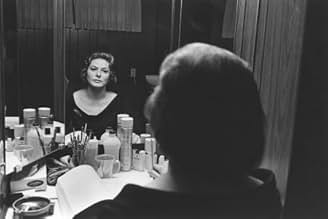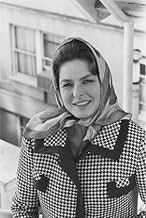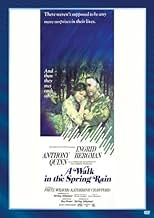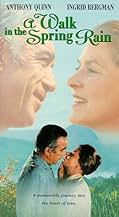The Merediths move to an isolated farm. Mrs. Meredith and the neighbour Will Cade become friends and anticipate becoming lovers.The Merediths move to an isolated farm. Mrs. Meredith and the neighbour Will Cade become friends and anticipate becoming lovers.The Merediths move to an isolated farm. Mrs. Meredith and the neighbour Will Cade become friends and anticipate becoming lovers.
- Director
- Writers
- Stars
Tom Holland
- Boy
- (as Tom Fielding)
Michael Bullock
- One of men in fight crowd
- (uncredited)
Janet Nelson Chadwick
- Singer at Festival
- (segment "Oh Shenandoah")
- (uncredited)
- Director
- Writers
- All cast & crew
- Production, box office & more at IMDbPro
6.01K
1
2
3
4
5
6
7
8
9
10
Featured reviews
Bergman and Quinn
Libby Meredith (Ingrid Bergman) is the dutiful wife of college professor Roger Meredith. They are traditional and do not approve of their daughter's personal pursuit away from her family obligations. Roger is on sabbatical writing a book. The couple leaves New York City for the country where Libby finds flirtatious neighbor Will Cade (Anthony Quinn).
There is a promise of an epic romance. It has the great pairing of Bergman and Quinn. It should be incredible. Libby as a conservative matriarch is set up to join the sexual revolution. I like the conflict between mother and daughter. I don't buy Anthony Quinn as an American, let alone a southerner. This should be a battle for Libby's heart and mind by the two men. There is a sudden twist that short-circuits the confrontation. In short, I don't like the twist which comes out of nowhere. Otherwise, the two leads and the premise provide interesting viewing.
There is a promise of an epic romance. It has the great pairing of Bergman and Quinn. It should be incredible. Libby as a conservative matriarch is set up to join the sexual revolution. I like the conflict between mother and daughter. I don't buy Anthony Quinn as an American, let alone a southerner. This should be a battle for Libby's heart and mind by the two men. There is a sudden twist that short-circuits the confrontation. In short, I don't like the twist which comes out of nowhere. Otherwise, the two leads and the premise provide interesting viewing.
A good love story
I read about some of the bad reviews here. I don't usually write a review of any film I have watched but this time around I felt like I need to jot down something nice about this movie. It wasn't as bad viewing as I initially thought.
I didn't expect it to be on par with other great love stories in calibre of Casablanca or Brief Encounter. But I think it is a decent film, amicable but has sad ending. The film has a beautiful scenery with the great Appalachians landscape during the spring season that makes my heart long to be in that place. It is good enough to fill my time as I didn't have any thing worthy to do. The film flows beautifully, slow at start but still engaging that keeps you glued to the screen.
The attraction between Libby and Will was a bit rushed and Quinn did not convince me enough as a mountain handyman. Something is missing here. The scene where Libby met with Will's son came out of nowhere. They should focus a bit more on relationship between Will and his son so we can fully understand their interaction or left hanging guessing ouselves. Did he love his son or not?
The great Ingrid Bergman as usual carries the whole movie on her shoulder. Put someone lesser in her part and the film would be unbearable to sit through. I enjoy looking at her matured beauty, she was 54 at the time but still has this luminosity and radiance coming out of her. Its hard to compete with her, when she was on screen everybody ceased to exist.
I didn't expect it to be on par with other great love stories in calibre of Casablanca or Brief Encounter. But I think it is a decent film, amicable but has sad ending. The film has a beautiful scenery with the great Appalachians landscape during the spring season that makes my heart long to be in that place. It is good enough to fill my time as I didn't have any thing worthy to do. The film flows beautifully, slow at start but still engaging that keeps you glued to the screen.
The attraction between Libby and Will was a bit rushed and Quinn did not convince me enough as a mountain handyman. Something is missing here. The scene where Libby met with Will's son came out of nowhere. They should focus a bit more on relationship between Will and his son so we can fully understand their interaction or left hanging guessing ouselves. Did he love his son or not?
The great Ingrid Bergman as usual carries the whole movie on her shoulder. Put someone lesser in her part and the film would be unbearable to sit through. I enjoy looking at her matured beauty, she was 54 at the time but still has this luminosity and radiance coming out of her. Its hard to compete with her, when she was on screen everybody ceased to exist.
Responsibility.
The awareness of having to answer for one's actions-the film, for example, touches on parental responsibility-but does this responsibility have an expiration date, or rather, is there a point when the best interests of one's son or daughter might take precedence over one's own? The protagonist finds herself having to choose between duty and desire, a choice that is simple at 20, but much less so at nearly 60.
Writer and university professor Roger Meredith (Fritz Weaver) decides to spend a sabbatical with his wife Libby (Ingrid Bergman) in a mountain cabin, using the time to write a new book. The cabin's owner, Will Cade (Anthony Quinn), who lives next door with his wife Ann, is always available, particularly to Libby, through constant and at times insistent courtship. The two couples share a difficult relationship with their children: Ellen Meredith (Katherine Crawford) is searching for a role other than that of mother imposed on her by society, while the Cade son (Tom Holland) is a tormented spirit always seeking new challenges.
Director Guy Green, with a sober and extremely photographic style, perfectly captures Libby Meredith's emotional storm; Stirling Silliuphant's screenplay, based on Rachel Maddux's novel, attempts to show passion in old age, but fails to convince the audience; the film's best aspect is undoubtedly the acting, with Ingrid Bergman always on point and Anthony Quinn vigorous and masculine, while Fritz Weaver's excessive coldness perhaps clashes a bit.
Best moments: mother and daughter, two generations confronting each other to assert their willingness to pursue their passions. A must-see for fans of aging love and great nature photography.
Writer and university professor Roger Meredith (Fritz Weaver) decides to spend a sabbatical with his wife Libby (Ingrid Bergman) in a mountain cabin, using the time to write a new book. The cabin's owner, Will Cade (Anthony Quinn), who lives next door with his wife Ann, is always available, particularly to Libby, through constant and at times insistent courtship. The two couples share a difficult relationship with their children: Ellen Meredith (Katherine Crawford) is searching for a role other than that of mother imposed on her by society, while the Cade son (Tom Holland) is a tormented spirit always seeking new challenges.
Director Guy Green, with a sober and extremely photographic style, perfectly captures Libby Meredith's emotional storm; Stirling Silliuphant's screenplay, based on Rachel Maddux's novel, attempts to show passion in old age, but fails to convince the audience; the film's best aspect is undoubtedly the acting, with Ingrid Bergman always on point and Anthony Quinn vigorous and masculine, while Fritz Weaver's excessive coldness perhaps clashes a bit.
Best moments: mother and daughter, two generations confronting each other to assert their willingness to pursue their passions. A must-see for fans of aging love and great nature photography.
10MacNessa
A tender romance torn apart by the actions of selfish offspring
How easy it is for the children to take their parents for granted? The key moment in the film is when the mother character(Ingrid Bergman) asks her daughter, if she has ever thought about her mother as a person. This is in response to her daughter's request that she leave her Smokey Mountains paradise(and new found love), so that she can take care of her grandchild while her daughter can be free to pursue her own law career. At the same time Anthony Quinn- Bergman's lover, is presented with a similar situation with his brutish son, who eyes the blossoming relationship with growing hostility. This is probably the main theme in this wonderfully shot and pleasantly paced drama. By todays standards the ending may be a little sad, but its far more realistic.
Two seemingly mismatched couples
This is a bittersweet tale of two people from different worlds who fall in love and are unhappily married to others. Ingrid Bergman and Anthony Quinn make this story poignant, well-acted and believable.
It's love at first sight for Quinn as he comes out the box, swinging and pitching in his attraction for her. Honestly, it's just a little unsettling him always popping up, being a corn-pone chatterbox, subtly moving in with the compliments and lingering looks. He comes out the gate heated; but who can blame him. It's Ingrid Bergman he's fancying. And she slowly simmers as her attraction grows for the Tennessee mountain man Quinn plays. She's the wife of a University professor ( Fritz Weaver. ) Nice guy, good provider, but you know the type: he's no ogre, but he's staid, pedantic, and definitely not romantic. As she is throughout her career in films, Bergman is the one to watch. Her characters are so full of life if only allowed to break free.
You know how unfair, biased, skewed and stark movies present choices when they pit Marriage vs the Love Affair. We've seen it time and time again ( "The Arnelo Affair", "There's Always Tomorrow", etc. ) Well this movie is no different. Quinn's wife (played by Virginia Gregg ) is as drab and as sexless as Bergman is glamorous and sensual. It's difficult to conjure up why there was even an attraction between them ( Quinn & Gregg ) in the first place. Fritz Weaver's character fares no better. Apparently he doesn't realize what we all know very well from watching movies; when a spouse says: "let's go away, just the two of us" your marriage is on the rocks. Yet Weaver is clueless. Him throwing up their age as a deterrent to living more spontaneously is also a fly in the liniment.
The movie throws in an unnecessary monkey wrench with the issues of the son and daughter of Quinn's and Bergman's in order to create conflict. I do like how Bergman stands up to her daughter in order to try and get some piece of happiness and joy out of life instead of maternal duty. No, we didn't need the kids in this to get conflict. The story should have stayed focused on how Bergman and Quinn handle their situation.
It's love at first sight for Quinn as he comes out the box, swinging and pitching in his attraction for her. Honestly, it's just a little unsettling him always popping up, being a corn-pone chatterbox, subtly moving in with the compliments and lingering looks. He comes out the gate heated; but who can blame him. It's Ingrid Bergman he's fancying. And she slowly simmers as her attraction grows for the Tennessee mountain man Quinn plays. She's the wife of a University professor ( Fritz Weaver. ) Nice guy, good provider, but you know the type: he's no ogre, but he's staid, pedantic, and definitely not romantic. As she is throughout her career in films, Bergman is the one to watch. Her characters are so full of life if only allowed to break free.
You know how unfair, biased, skewed and stark movies present choices when they pit Marriage vs the Love Affair. We've seen it time and time again ( "The Arnelo Affair", "There's Always Tomorrow", etc. ) Well this movie is no different. Quinn's wife (played by Virginia Gregg ) is as drab and as sexless as Bergman is glamorous and sensual. It's difficult to conjure up why there was even an attraction between them ( Quinn & Gregg ) in the first place. Fritz Weaver's character fares no better. Apparently he doesn't realize what we all know very well from watching movies; when a spouse says: "let's go away, just the two of us" your marriage is on the rocks. Yet Weaver is clueless. Him throwing up their age as a deterrent to living more spontaneously is also a fly in the liniment.
The movie throws in an unnecessary monkey wrench with the issues of the son and daughter of Quinn's and Bergman's in order to create conflict. I do like how Bergman stands up to her daughter in order to try and get some piece of happiness and joy out of life instead of maternal duty. No, we didn't need the kids in this to get conflict. The story should have stayed focused on how Bergman and Quinn handle their situation.
Did you know
- GoofsThe daughter's position at the kitchen table when Ingrid Bergman hits the cup and saucer with her hand.
- Quotes
Ellen Meredith: Why is it that if a woman wants to accomplish something, even her own parents consider her aggressive, unhappy or neurotic?
Roger Meredith: Because it's usually true.
- ConnectionsFeatured in The Hollywood Collection: Anthony Quinn an Original (1990)
- SoundtracksTitle song
("A Walk in the Spring Rain")
by Elmer Bernstein and Don Black
Title song sung by Michael Dees
- How long is A Walk in the Spring Rain?Powered by Alexa
Details
- Release date
- Country of origin
- Language
- Also known as
- Setnja po prolecnoj kisi
- Filming locations
- Production company
- See more company credits at IMDbPro
Box office
- Gross worldwide
- $52
- Runtime
- 1h 38m(98 min)
- Sound mix
- Aspect ratio
- 2.35 : 1
Contribute to this page
Suggest an edit or add missing content































